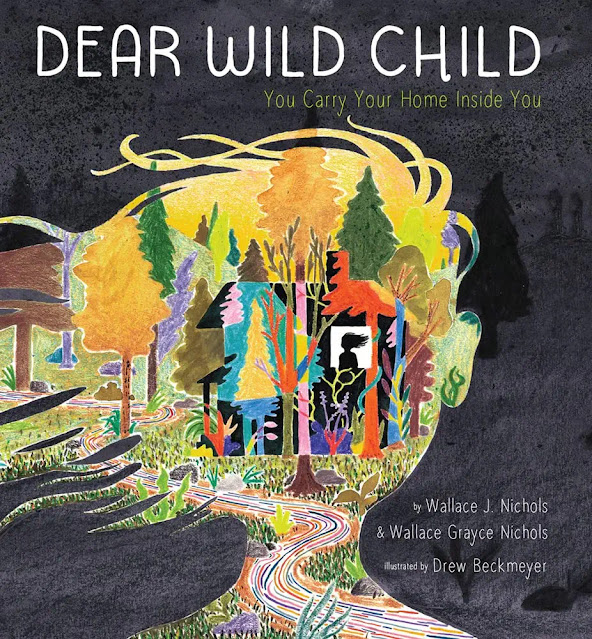Disclosure: I was sent a copy of this book in exchange for an honest review. All opinions are my own.
With climate change the world is truly changing and we are seeing damage to homes. Whether it is wildfires, tornados, hurricanes or something else, home loss can be devastating to all but especially to children. For me it was simply my parents downsizing when I went to college. I was the youngest of three and it was time for them to sell the house and move to a smaller condo. Even without devastation of the home, there is a loss, but as Wallace Nichols and his daughter Wallace Grace Nichols share the home goes with you with all the memories. The book is Dear Wild Child by Wallace J. Nichols and Wallace Grace Nichols and illustrated by Drew Beckmeyer. It is recommended for age 4 to 8.
From the Publisher:
In the shade of ancient redwood trees, by a creek, not far from the ocean, a father builds a house for his newborn daughter, where she grows up wild and strong in their coastal canyon home. When a wildfire takes back their beloved house, a father writes his now-grown daughter a letter telling her it’s gone. Inspired by the real letter the author wrote his daughter, this poignant story—written together by father and daughter—joyfully declares that a home is more than just wood and stone; it is made of love and can never be taken away. You carry home with you wherever you go.
From Me:
The story itself is very specific to the Nichols family. It describes their home and the place they lived as their girls grew up. It talks about its location and how Wallace and his wife chose a place in the wild for the children to grow. It truly shares memories for their family with all of us. The story comes from a letter Wallace wrote to Wallace Grace when the wildfire went through and destroyed their home. In the Author's Note at the end, it shares the tale of how Wallace Grace, their oldest daughter, left for her first year of college the day before the electrical storm that caused the wildfire. In his letter and in the book Wallace shares with the reader that a home is truly with each of us. It is the memories we take from the place. It is the memories of playing in the yard (or the wild). It is the memories of first steps, holidays, and family meals. It is the memory of the love shared. This is the universal message that is true no matter how a home is lost.
As I read this book, I thought about my own childhood memories. The house I grew up in from the age of 3 until after I was in college is full of many memories and love. I remember moving out of it. I remember the feeling of loss and the wonder of the new place. Like Wallace Grace I was in college so there was already that sense of a new life. And although our old home was not destroyed it is owned by new people. They have made their own changes to the house, and it is no longer the same. Our house was always yellow and now it is not. I remember taking Hazel to drive by my old house and the entire neighborhood looks different. The fence that was always there as far back as I can remember is gone. My mother says the elderly neighbor put it up when we moved in because she didn't want us kids running in her yard. Her daughter never took it down while we were there, but it is gone now. The houses are all different colors from what they were when we lived there. I remember a year or so after moving out going with my parents and seeing the changes the new owners made. It was so different. Not a bad different, but not the same as our memories. So even without destruction, houses can leave us and change. This book reminds us that our memories of that home are always with us.
The illustrations in the book are beautiful and full of details. We see the life they lived and the beauty of the storm to the destruction. Although it is recommended for ages 4 to 8, I could see discussions with this story discussed with older kids as well especially with a move or natural disaster. I have to add that with the heat waves that our country is experiencing this summer even here in our Northeast corner we have had wildfires. Luckily, they were confined to state parks, so homes were not destroyed but with climate change anything is possible.







No comments:
Post a Comment
I love to hear your comments and ideas. Thank you for reading and contributing!